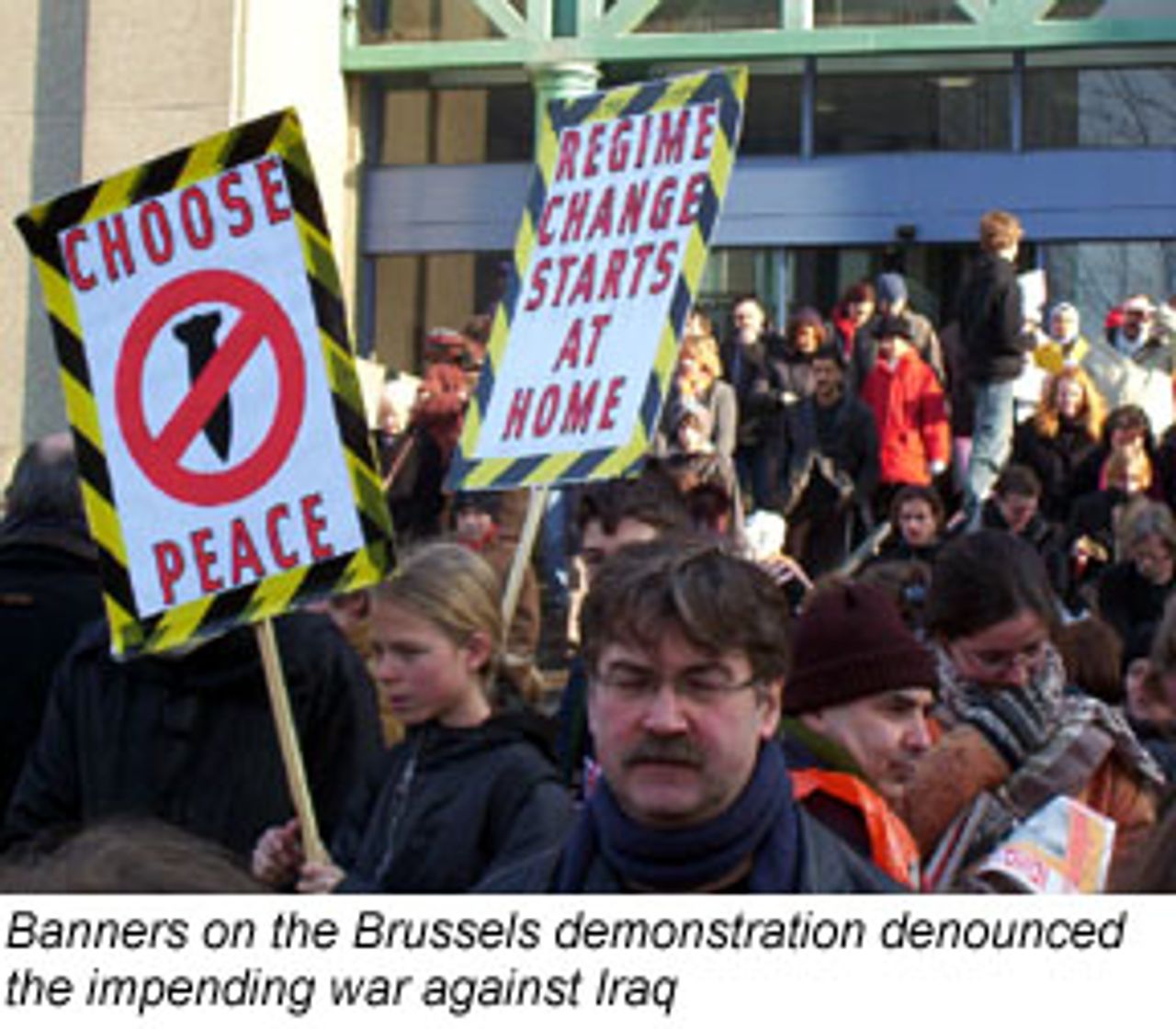 Some 100,000 people demonstrated Saturday in the streets of Brussels to oppose the impending war against Iraq. The demonstration was called by two umbrella organisations, “Stop USA” and “Anti-guerre Irak.” As a result, the protest ended with two separate rallies at different locations.
Some 100,000 people demonstrated Saturday in the streets of Brussels to oppose the impending war against Iraq. The demonstration was called by two umbrella organisations, “Stop USA” and “Anti-guerre Irak.” As a result, the protest ended with two separate rallies at different locations.
The organisers had insisted that the protest be a “citizens’ demonstration”, and announced that political parties would be prevented from placing themselves in the forefront. Nevertheless, representatives of the government parties—the Socialist Party, Greens and Liberals—took part.
At one point the Socialist Party delegation was pelted with eggs because the Belgian government is supporting the American war machine logistically in Kuwait and Quatar, and is not opposed to European intervention under UN auspices in the area. Sections of the demonstrators denounced this hypocrisy.
Groups taking part in the protest included Belgian-based peace organizations, NGOs, Christian organisations, women’s organisations, trade unions and ecological groups. The Attac movement was also represented.
Families with children, non-organised youth, students and workers made up a large section of the crowd. There was also a considerable number of demonstrators from the Belgian Arab community. Banners in Flemish, French, English and Arabic read “No war for oil”, “Who’s the dictator?”, “No war”, “No blood for oil”, “No to American dictatorship”, “Regime change starts at home” and “Stop Israeli occupation.”
Many of the participants wore baseball caps with the logo “Not in our name.” There were also many young participants from areas in Germany and France bordering Belgium. Trade union delegations from Germany (Ver.di and IGM) took part in the protest.
At one of the two rallies speakers denounced the Bush administration’s plans for war, saying terrorism was not “an argument for war”. One trade union speaker called for a ban on US military transports through Belgium—something that has been allowed by the government.
Another speaker called for people to hang white flags out of their windows as a symbol of opposition to war. Roberto D’Orazio, a trade unionist, denounced “war under all its forms, including embargos that have killed as many people as war itself.” Another speaker said, “At the beginning of the twenty-first century we are experiencing the same colonial wars as at the beginning of the last one. The only difference is that they are carried out with weapons of massive destructive power.”
The World Socialist Web Site was present at the demonstration with a table displaying political material that attracted keen interest. One thousand copies of the WSWS editorial statement on the war were distributed. In contrast to peace demonstrations 10 or 20 years ago, the attitude of the demonstrators was more serious and reflective. Most of those we spoke to were quite open to the WSWS’s analysis and explanation of the international situation and the tasks of the antiwar movement.
There were some illusions that European governments, including the Belgian, might act to halt the US-British war drive. The Belgian “rainbow coalition” had supported Germany and France in opposing the US demand that NATO endorse military steps for the defence of Turkey against potential attacks from Iraq. This was perceived by some as opposition to war.
One young participant, Bruno, thought a “political institutional solution” was still workable, and that it was necessary to “test out” the possibilities. Referring to the government, he said, “As long as their action prevents war, one has to support it. I came here to say to the politicians, we are keeping an eye on you.”
Another position was put forward by a young electrician, Brecht, who said he read the WSWS regularly, and judged the Belgian, French and German governments’ opposition to Bush to be “opportunist” and not really against a war. He said he appreciated the WSWS because of its extensive coverage of the situation in America.
The demonstration evinced little in the way of nationalist sentiments, with many demonstrators emphasising that their focus of anger was the Bush administration, and not Americans in general.
